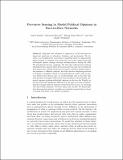Pervasive sensing to model political opinions in face-to-face networks
Author(s)
Madan, Anmol Prem Prakash; Farrahi, Katayoun; Gatica-Perez, Daniel; Pentland, Alex Paul
DownloadPentland_Pervasive Sensing.pdf (569.5Kb)
OPEN_ACCESS_POLICY
Open Access Policy
Creative Commons Attribution-Noncommercial-Share Alike
Terms of use
Metadata
Show full item recordAbstract
Exposure and adoption of opinions in social networks are
important questions in education, business, and government. We de-
scribe a novel application of pervasive computing based on using mobile
phone sensors to measure and model the face-to-face interactions and
subsequent opinion changes amongst undergraduates, during the 2008
US presidential election campaign. We nd that self-reported political
discussants have characteristic interaction patterns and can be predicted
from sensor data. Mobile features can be used to estimate unique individ-
ual exposure to di erent opinions, and help discover surprising patterns
of dynamic homophily related to external political events, such as elec-
tion debates and election day. To our knowledge, this is the rst time
such dynamic homophily e ects have been measured. Automatically esti-
mated exposure explains individual opinions on election day. Finally, we
report statistically signi cant di erences in the daily activities of individ-
uals that change political opinions versus those that do not, by modeling
and discovering dominant activities using topic models. We nd people
who decrease their interest in politics are routinely exposed (face-to-face)
to friends with little or no interest in politics.
Date issued
2011-06Department
Massachusetts Institute of Technology. Engineering Systems Division; Massachusetts Institute of Technology. Media Laboratory; Program in Media Arts and Sciences (Massachusetts Institute of Technology)Journal
Pervasive computing. (9th International Conference, 2011) (Lecture notes in computer science ; v. 6696)
Publisher
Springer
Citation
Madan, Anmol et al. “Pervasive Sensing to Model Political Opinions in Face-to-Face Networks.” Pervasive Computing. Ed. Kent Lyons, Jeffrey Hightower, & Elaine M. Huang. Berlin, Heidelberg: Springer Berlin Heidelberg, 2011. 214-231. Copyright © 2011, Springer Berlin / Heidelberg
Version: Author's final manuscript
ISBN
9783642217265
3642217265